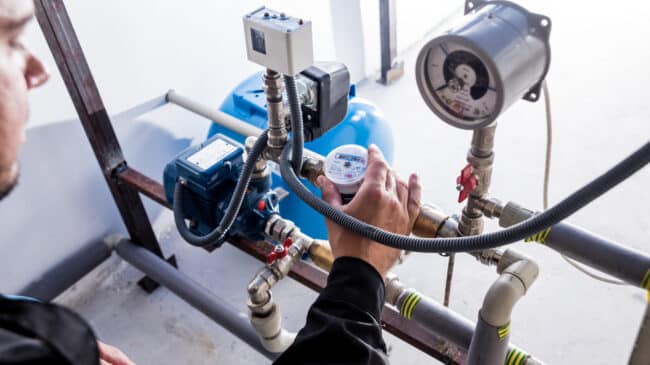Several cities, including Baltimore, Chicago, and Philadelphia have considered, or recently enacted, measures designed to provide water services for low-income customers at reduced costs and to eliminate shutoffs for past-due accounts. Yet, these laudable goals are often tied to something that makes reaching them even more difficult —banning water agencies from contracting with private sector companies.
Many of us don’t often think about the vast resources required to ensure our tap water remains clean and our sewage is properly diverted. But inadequate water, wastewater, and stormwater infrastructure contribute to the approximately 900 billion gallons of clean water wasted by household leakage every year, according to the U.S. Environmental Protection Agency. A 2013 report from the Center of Neighborhood Technology estimates 2.1 trillion gallons of clean water is lost every year, mostly from a combination of leaking and broken pipes.
Wastewater and stormwater systems have their own problems; cities with combined (wastewater/stormwater) sewers discharge billions of gallons of diluted sewage and industrial wastewater into waterways each year. The EPA estimates a minimum of 23,000–to-75,000 overflow discharge events occur in any given year from sanitary (not combined with stormwater) sewer systems.
Many systems are falling behind from a technological standpoint, relying on an excess of manual labor to read meters and perform other tasks that could be partially or fully automated.
Finding answers to the structural and technical problems will be extremely costly—$600 billion in the next 20 years, the EPA says—and seeking additional equity goals add to those costs by lowering the ratepaying base. Getting all of these things right will require innovation, extensive education and training.
Unfortunately, the equity goals sought by water-for-all proposals are often tied with blanket opposition to outsourcing and privatization of municipal water systems. Yet, the main benefits the private sector brings through contracting include state-of-the-art practices, innovation, and improved technology—the types of solutions needed to upgrade, modernize and maintain water systems.
Some jurisdictions are utilizing the private sector’s expertise and efficiency. Atlanta (operations and management), San Antonio (water delivery), Milwaukee (wastewater treatment), and many other cities continue to renew contracts with private companies to realize their water goals at lower costs, accumulating savings that are passed on to customers.
Moreover, accessing the innovation, knowledge, financing, and construction capacity to meet the environmental and equity challenges of municipal water will often require contracts with private sector companies.
Baltimore’s private water ban went into effect last year, but the city’s many failures, as documented by the Inspector General, required contracting anyway. The Inspector General report noted late last year that the amount of “fraud, waste, and misconduct” cost “millions of dollars in lost water and sewer revenues,” “thousands of digital water meters…are not fully functional,” and over 8,000 tickets of about 12,000, mostly concerning “zero-read” (not charging customers) account-related issues, remained unresolved for over a year.
The COVID-19 pandemic has exacerbated Baltimore’s shortcomings, as the 63 Meter Shop employees, who install, replace, and repair all 400,000 water meters in the city and county, were placed on paid leave in March 2020. By the Inspector General report’s release in December 2020, only 18 had returned to work, of which only 11 had “the training and ability to handle meter-related tasks…includ(ing) reading meters,” while also being confined to the use of a single vehicle.
As a result of the city’s reduced Meter Shop, last October the county entered an emergency contract with a private firm to provide monthly readings for 210,000 meters. The city, too, despite its ban, entered over $5.7 million in water contracts last year, mostly related to repair, replacement, billing, and related software.
The water equity advocates achieved another self-debilitating victory in Baltimore this January when an attempt to outsource the Meter Shop itself was defeated. Instead of cutting costs and improving revenues through better trained and fewer staff, Baltimore is ensuring its ratepayers get the worst of both worlds: uncollected revenues from ineffective meters and a bloated, ill-trained workforce to manage the solution. Baltimore claims the employees will be properly trained to improve operations, but even getting meters functional enough to bill customers will likely be a steep uphill climb for the city to manage by itself.
Many water agencies rely on contracting with private companies because they see advantages in having a private sector company fulfill duties the public expects of its agencies. When agencies are open to innovative solutions, contracting can bring considerable value to the building, operating, repairing, and replacing of water-related infrastructure.
That value actually makes equity-focused goals more achievable.
Water equity advocates hope to achieve universal ratepaying assistance for low-income customers, as well as a ban on shutting off water services of those who cannot afford the bills. While admirable, those goals put even more pressure on municipal water agencies to provide reliable and expensive services with an even smaller revenue base to pay for them. Contracting with experienced private companies can provide effective and accountable solutions to help relieve that pressure, which is why water equity advocates should embrace private sector contracting, not seek to ban it entirely.

